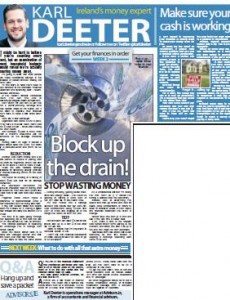 In last weeks instalment we started by asking you to set up two things, firstly was to fill in a ‘standard financial statement’, this is now the foundation of your budget, the second was to start a ‘spending diary’. These two items will form the twin pillars of changing your wealth.
In last weeks instalment we started by asking you to set up two things, firstly was to fill in a ‘standard financial statement’, this is now the foundation of your budget, the second was to start a ‘spending diary’. These two items will form the twin pillars of changing your wealth.
This week we are going to try to put some of the things you might spend money on into perspective so that you can see the power of making tiny changes to your financial lifestyle and the way in which they can give you an edge without turning you into a penny-pinching Scrooge who then rapidly loses all of their mates.
Here’s a few simple examples.
Cigarettes cost about €8.30 a pack, if you have a 20 a day habit then that will cost you €2,990 a year, while also costing you aspects of your health, and making you smell nasty at the same time – it’s a lose-lose all around! This amount of money is more than a months take home pay for a person on the average industrial wage. If I walked up to you right now and said ‘any chance you could spare me €3,000’ I’d know what answer to expect!
Paying over the odds for insurances can cost an extra €1,500 or more per year, and unlike cigarettes I have never met an insurance addict so chopping these costs straight away should be simple.
Energy is considered to have an almost ‘inelastic demand’ meaning that when the price changes that consumption is relatively unaffected, if petrol prices went to €4.00 a litre would you still buy petrol? If electricity prices doubled would you stop using it; better yet, could you if you wanted to?
The fact that there are massive savings available by switching both electricity and gas providers or opting for the best package with an existing provider makes this a no-brainer. Between them you could be looking at about €250 per year for an average household.
Two weeks ago we mentioned the ‘cheapo-quick-fix’ insulation idea of buying draft excluder’s for front and back doors and a few rolls of low cost fibre attic insulation, that could also make a difference of €200 per year because you’ll be using less heat by keeping the cold out.
If you buy bottled water and spend about €5 a week on it, then buying a water filter instead will save you about €175 a year. Just keep going through your spending list and finding better alternatives, this rational approach to spending means changing your habits, and it is the ‘money habits’ we have that are difficult to change as opposed to getting used to new ways, so what we have found works best is to make the change quickly and stay with it until it feels normal.
But enough of the examples, the point being made here is as follows; if you were to take the three items above and shift that spending into saving then you could be looking at having a lump sum of €27,277 after tax when you put that money into a savings account that makes 4% (annual contributions being (€5,000 and DIRT at 27%).
Imagine all of the things you could do with €27,000! and without having to sacrifice a single aspect of your life (because quitting smoking in this example is not factored in as a sacrifice!). For the non-smokers, even if you only opted for other pain free savings of €3,000 you’d be looking at amassing a tidy €16,400 after tax in year 5.
An important consideration is quality of life, I don’t buy into financial equivalents of crash dieting where you have to go to a zero spend and only contemplate money all day, and as a professional advisor I am telling you this: don’t do it, it makes you boring (I learned that the hard way!).
So now that you are armed with the power of both compound interest and simple pain free savings I’d like you to take a look at the Standard Financial Statement you have filled in (if you haven’t then you can find it on the news section of www.advisors.ie) and next you just have to get a free hour and an internet connection because we will build some walls on the financial foundations you already set out.
Look at every expenditure you make and then see go online and look for deals, price comparisons or offers related to whatever areas of your standard financial statement you have listed out. Simply take one item at a time and see if you can find a better deal, if so then make a note of the relevant cost versus what you are paying at the moment, and when you add it all up at the end you might be very surprised about how much you stand to save!
Next week we’ll talk about day to day spending as your two weeks of keeping a ‘spending diary’ come to an end!

Post a Comment